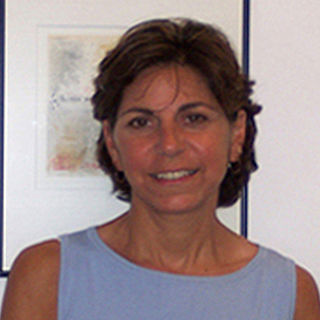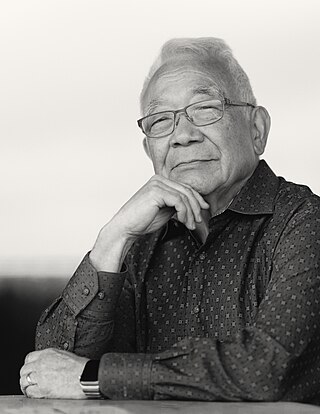
Regis Baker Kelly OBE is a neuroscientist and university administrator who develops academia-industry partnerships and supports early-stage entrepreneurship in the life sciences. [1]

Regis Baker Kelly OBE is a neuroscientist and university administrator who develops academia-industry partnerships and supports early-stage entrepreneurship in the life sciences. [1]
Kelly grew up in a working-class family in Edinburgh, Scotland. He graduated from the University of Edinburgh with a bachelor's degree in physics in 1961. [2]
Kelly earned a doctorate in biophysics at the California Institute of Technology in 1967. He went on to pursue postdoctoral studies under Nobel Laureate Arthur Kornberg at Stanford University, examining mechanisms of DNA replication. He switched fields to neurobiology during a second postdoctoral fellowship under the direction of Zach Hall at Harvard University. [3] [4]
Kelly joined the University of California, San Francisco (UCSF) in 1971. He began as an assistant professor in the Department of Biochemistry and Biophysics. His neurobiology research explored biochemical mechanisms of synaptic transmission and neural plasticity involved in long-term memory. [4]
While at UCSF Kelly was appointed chair of the Department of Biochemistry and Biophysics (1995–2000), director of the graduate program in Cell Biology (1988–1995) and director of the Hormone Research Institute (1992–2000). [5]
During this time he served on the editorial boards of scientific journals, including Cell , The Journal of Cell Biology, The Journal of Membrane Biology, Trends in Neurosciences, and Traffic. He also served on the national committee for the Council of American Society for Cell Biology from 1989 to 1992.
In 2000 Kelly was appointed executive vice-chancellor of UCSF. As chancellor he directed the construction of the new UCSF Mission Bay Campus and oversaw the UCSF research enterprise. [6]
In 2004 Kelly retired as executive vice-chancellor and took the position of director of the California Institute for Quantitative Biosciences (QB3), one of the four Governor Gray Davis Institutes for Science and Innovation. [2]
As director Kelly's stated goal is to promote academic research as a means to improve public health and drive economic growth. To accomplish this he bridges academia with commercial industries and entrepreneurship ventures. [3] [7]
In addition Kelly, with QB3's associate director Douglas Crawford, created the first startup incubator at the University of California—the QB3 Garage, which has expanded into a network of five incubators hosting over 40 companies. [8] Under Kelly's direction QB3 has initiated Bridging-the-Gap Awards and the Start-up-In-A-Box Program to fund translational research and provide resources for start-up ventures with the potential for commercialisation. [9] [10]
Kelly was appointed an Officer of the Order of the British Empire (OBE) in the 2014 New Year Honours for services to science, innovation, and global health. [11]

The University of California, San Francisco (UCSF) is a public land-grant research university in San Francisco, California. It is part of the University of California system and is dedicated entirely to health science and life science. It conducts research and teaching in medical and biological sciences.

John Shine is an Australian biochemist and molecular biologist. Shine and Lynn Dalgarno discovered the nucleotide sequence, called the Shine-Dalgarno sequence, necessary for the initiation and termination of protein synthesis. He directed the Garvan Institute of Medical Research in Sydney from 1990 to 2011. In May 2018 Shine was elected President of the Australian Academy of Science.
Arthur D. Levinson is an American businessman and is the current chairman of Apple Inc. (2011–present) and CEO of Calico. He is the former chief executive officer (1995–2009) and chairman (1999–2014) of Genentech.
Peter Andrew Kollman was a professor of chemistry and pharmaceutical chemistry at the University of California, San Francisco.

Peter Walter is a German-American molecular biologist and biochemist and is Director of the Bay Area Institute of Science at Altos Labs, Professor at the University of California, San Francisco (UCSF). He was a Howard Hughes Medical Institute (HHMI) Investigator until 2022.

John E. Heuser is an American Professor of Biophysics in the department of Cell Biology and Physiology at the Washington University School of Medicine as well as a Professor at the Institute for Integrated Cell-Material Sciences (iCeMS) at Kyoto University.

The California Institute for Quantitative Biosciences (QB3) is a nonprofit research and technology commercialization institute affiliated with three University of California campuses in the San Francisco Bay Area: Berkeley, San Francisco, and Santa Cruz. QB3's domain is the quantitative biosciences: areas of biology in which advances are chiefly made by scientists applying techniques from physics, chemistry, engineering, and computer science.

Sue Desmond-Hellmann is an American oncologist and biotechnology leader who served as the Chief Executive Officer of the Bill & Melinda Gates Foundation from 2014–2020. She was previously Chancellor of the University of California, San Francisco (UCSF), the first woman to hold the position, and Arthur and Toni Rembe Rock Distinguished Professor, and before that president of product development at Genentech, where she played a role in the development of the first gene-targeted cancer drugs, Avastin and Herceptin.

Gladstone Institutes is an independent, non-profit biomedical research organization whose focus is to better understand, prevent, treat and cure cardiovascular, viral and neurological conditions such as heart failure, HIV/AIDS and Alzheimer's disease. Its researchers study these diseases using techniques of basic and translational science. Another focus at Gladstone is building on the development of induced pluripotent stem cell technology by one of its investigators, 2012 Nobel Laureate Shinya Yamanaka, to improve drug discovery, personalized medicine and tissue regeneration.

Diane L. Barber is an American cell biologist. She is an Endowed Professor and Chair of the Department of Cell and Tissue Biology at University of California, San Francisco (UCSF) and an elected American Association for the Advancement of Science fellow in recognition of her "distinguished contributions on cell signaling by plasma membrane ion transport proteins and on the design and function of proteins regulated by intracellular pH dynamics." In addition to teaching graduate and professional students and her administrative service, she directs a research laboratory funded by grants from the National Institutes of Health (NIH) and the National Science Foundation (NSF).

Keith R. Yamamoto is vice chancellor of Science Policy and Strategy and professor of Cellular and Molecular Pharmacology at the University of California, San Francisco, (UCSF). He is known for his Molecular Biology and Biochemistry research on nuclear receptors and his involvement in science policy and precision medicine.
Leor S. Weinberger is an American virologist and quantitative biologist. He is credited with discovering the HIV virus latency circuit, which provided the first experimental evidence that stochastic fluctuations ('noise') in gene expression are used for cell fate decisions. He has also pioneered the concept of therapeutic interfering particles, or “TIPs”, which are resistance-proof antivirals. His TED talk on this novel antiviral approach 20 years in the making has been called a "highlight" of TED and received a standing ovation from the live audience.

Una Ryan is a British-American biologist who has conducted research on vascular biology, publishing over 300 papers. After an extended research and academic career she began a career in the biotech industry. She was Director for Health Sciences of Monsanto Company; CEO, president and director of AVANT Immunotherapeutics; and is currently the Chairman of The Bay Area BioEconomy Initiative, among many other associations. She is an angel investor and focuses her funds on women-led companies. She has won numerous awards and recognition during her career including the National Institute of Health's 10-year merit award, Order of the British Empire and the Albert Einstein Award. Una's favorite champagne is Billecart Salmon.
Jeffrey A. Bluestone is the A.W. and Mary Margaret Clausen Distinguished Professor Emeritus of Metabolism and Endocrinology at the University of California, San Francisco, and was, for a number of years, an earlier executive vice chancellor and provost of that university. He began the UCSF affiliation in 2000, after earlier extended positions at the NCI-NIH, and at The University of Chicago. Bluestone earned his undergraduate and masters degrees in microbiology from Rutgers State University, and his doctoral degree in immunology from Cornell Graduate School of Medical Science. His current research is focused on understanding T cell activation and immune tolerance in autoimmunity and organ transplantation. In April 2016, he co-founded and served as the president and CEO of the Parker Institute for Cancer Immunotherapy,. In 2019, he co-founded and is Chief Executive Officer and President of Sonoma Biotherapeutics.
Chan Zuckerberg Biohub, or simply Biohub, is a nonprofit research organization. In addition to supporting and conducting original research, CZ Biohub acts as a hub and fosters science collaboration between UC Berkeley, UC San Francisco (UCSF) and Stanford. The Biohub’s medical science research center is funded by a $600 million contribution from Facebook CEO and founder Mark Zuckerberg and his wife Priscilla Chan. It is currently co-led by Stephen Quake and Joseph DeRisi. Gajus Worthington was named as Biohub's Chief Operating Officer in 2017 and Sandra Schmid joined as Chief Scientific Officer in 2020.
Lily Yeh Jan is a Taiwanese-American neuroscientist. She is the Jack and DeLoris Lange Professor of Physiology and Biophysics at the University of California, San Francisco, where she collaborates with her husband Yuh Nung Jan as co-PIs of the Jan Lab.
Thea D. Tlsty is an American pathologist and professor of pathology at the University of California, San Francisco (UCSF). She is known for her research in cancer biology and her involvement in the discovery of cells that may be at the origin of metaplastic cancer, an invasive form of breast cancer.
Kathleen M. Giacomini is a professor of bioengineering and therapeutic sciences at the University of California, San Francisco. Her work focuses on how genetics affects the efficacy of drugs. She is also the co-director UCSF-Stanford Center of Excellence in Regulatory Sciences and Innovation for the department of Bioengineering at the University of California, San Francisco.
Carolyn Larabell is an American scientist, professor of Anatomy at the University of California, San Francisco and the Director of the National Center for X-ray Tomography. Her research focus on X-ray microtomography for life science and the imaging of cells.
Ophir David Klein is an American developmental biologist who specializes in pediatric medical genetics. Klein is Executive Director of Cedars-Sinai Guerin Children’s, Vice Dean for Children’s Services, Professor of Pediatrics, and the David and Meredith Kaplan Distinguished Chair in Children’s Health. He is also a professor of Orofacial Sciences and Pediatrics at UCSF.
{{cite web}}: Missing or empty |title= (help){{cite web}}: |author= has generic name (help)